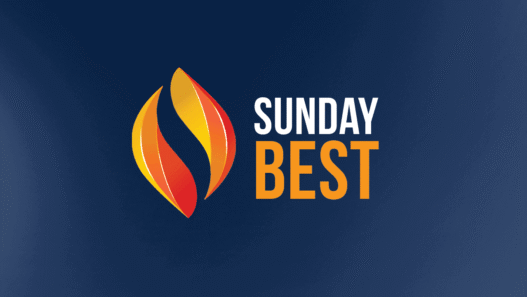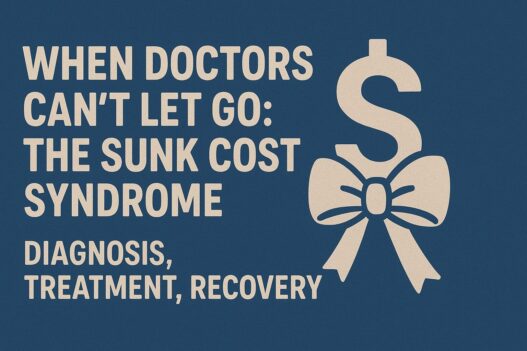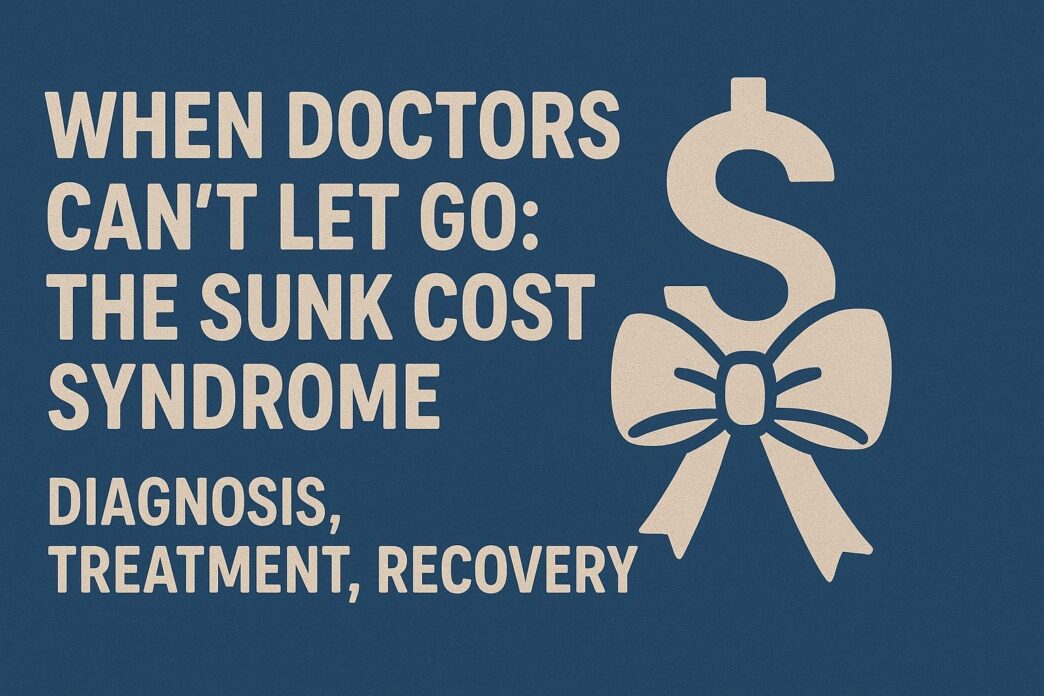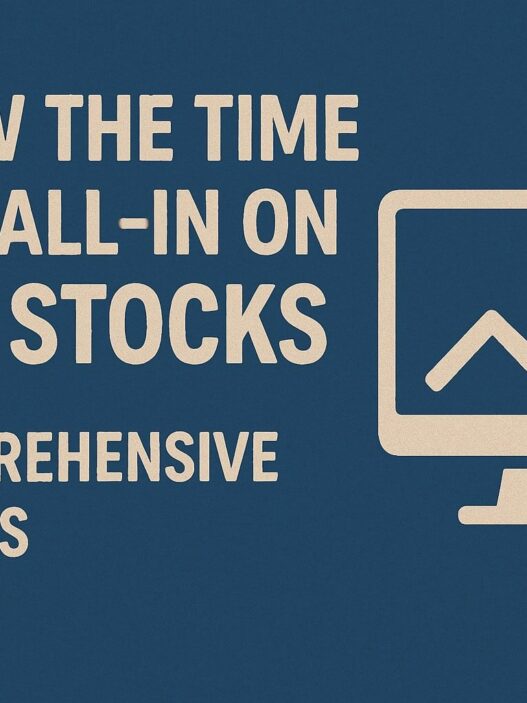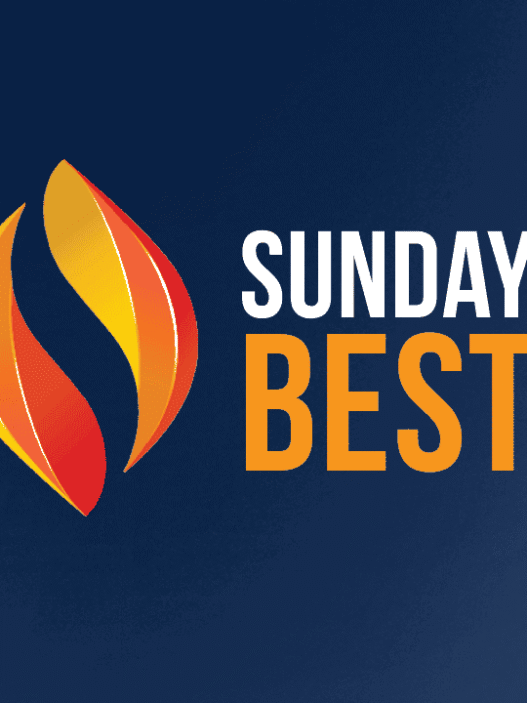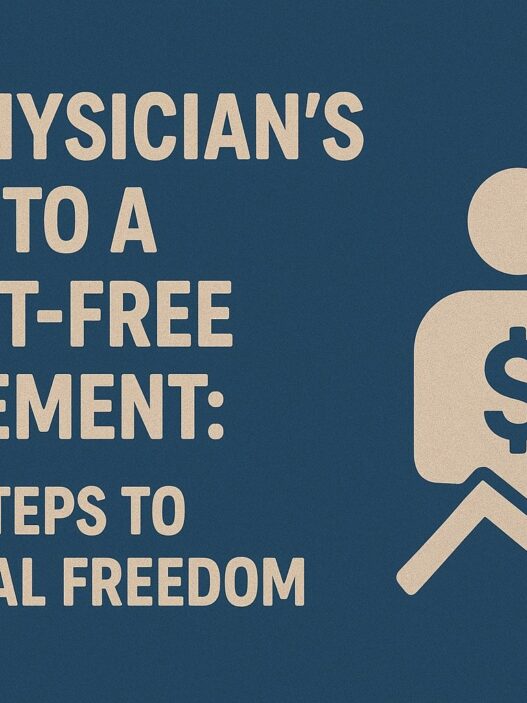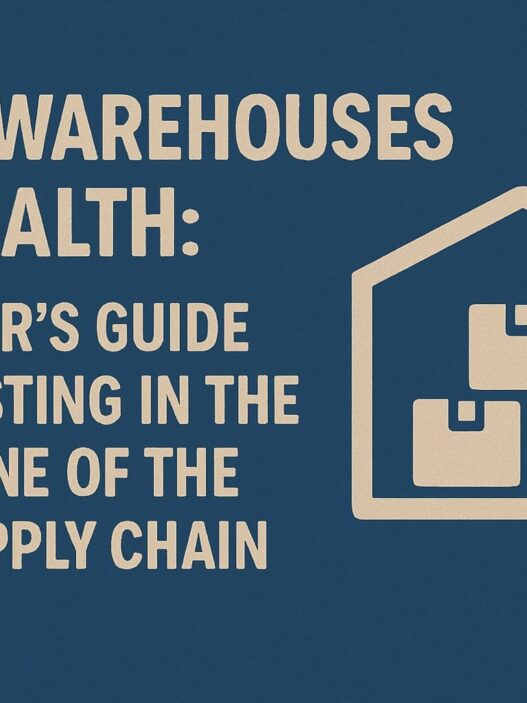Trigger Warning: The following contains descriptions of physicians making rational career decisions and abandoning failing investments. Side effects may include questioning life choices and sudden urges to update LinkedIn profiles. If you experience prolonged introspection lasting more than four hours, consult your therapist immediately.
Mr. Rodriguez had been in the ICU for three months. Multiple organ failure. Ventilator dependent. Family meetings every week about “doing everything possible.” We'd tried every intervention in the book. His condition wasn't improving. But stopping felt like giving up on all those weeks of intensive care.
My attending pulled me aside. “Sometimes the best medicine is knowing when to stop.”
He was talking about futile care. I heard career advice.
Why Do Smart Doctors Make Dumb Career Decisions?
We physicians excel at diagnosing sick patients. We're terrible at diagnosing our own dead-end professional decisions.
Medicine breeds a particular strain of sunk cost thinking. We're trained to persist against impossible odds. Fight death. Never give up. That same mentality — heroic patient care — becomes toxic when applied to career decisions.
A sunk cost is money, time, or effort you've already spent. It's gone. Irrecoverable. Like that $500,000 medical school debt that exists whether you practice medicine or become a surf instructor.
An opportunity cost is what you lose by not doing something else. Have you ever considered looking beyond what you've already invested? The opportunities you've missed by sticking in one place?
Take career transitions as an example.
I know emergency docs who hate shift work but won't move to urgent care. “I've already done four years of emergency training,” they rationalize. “Urgent care is beneath me.” So, they spend their careers dreading every night shift because abandoning that emergency medicine identity feels like a professional downgrade.
But what's the opportunity cost? Better hours. Predictable schedule. Weekends with family. Lower stress. Higher job satisfaction. They're sacrificing decades of happiness to avoid “wasting” four years of training that's already completed.
Private practice physicians cling to failing clinics like ventilators on brain-dead patients. Monthly losses mount. Staff turnover accelerates. Malpractice insurance climbs. But they've poured $300,000 into equipment and buildout. Walking away means acknowledging total loss.
Meanwhile, employed physicians at the hospital make more money with zero administrative headaches. The opportunity cost of staying? Financial security, work-life balance, and sanity.
Academic physicians endure toxic departments because they've published papers there, built reputations, and established research lines. Starting fresh elsewhere means rebuilding from scratch. So they accept underpayment and political warfare while their private practice classmates buy vacation homes.
The opportunity cost? Higher income, better working conditions, respect from colleagues who aren't backstabbing politicians with advanced degrees.
In case you missed it, The Nightmare Before Retirement: A Physician's Cautionary Tale
The Psychology Behind Medical Stubbornness
This is sunk cost fallacy in scrubs. Past investments controlling current decisions.
Past medical training is not indicative of future career satisfaction. Individual results may vary. Side effects may include temporary income reduction, identity confusion, and awkward medical conference conversations.
These anecdotes are based on real physicians and not evidence-based but only anecdotal evidence. No peer review was conducted on these career observations.
Why do intelligent physicians fall into this trap? The answer lies in how medicine shapes our psychology.
Medical training creates identity fusion. You don't just work as a doctor; you are a doctor. Your specialty becomes part of your DNA. Cardiologists don't treat hearts; they embody cardiovascular expertise. Surgeons don't just operate; they live and breathe surgical precision.
This identity fusion makes career changes feel like personality amputation.
A radiologist considering telemedicine work doesn't think “I'm exploring new opportunities.” They think, “I'm abandoning radiology. I'm betraying everything I've worked for.”
Medical school reinforces this thinking. Four years of training. Residency. Fellowship. Board certifications. Each step feels sacred. Walking away from any piece feels like professional sacrilege.
But here's what they never taught us: those investments are already made. The rational decision ignores past costs and focuses solely on future value.
Also read: Learning to Work With Intention as a Financially Independent Physician
When Persistence Actually Pays Off in Medicine
The sunk cost fallacy isn't always wrong in medicine. Sometimes stubborn persistence leads to breakthrough outcomes.
Consider the cardiologist who spent fifteen years perfecting transcatheter valve replacement. Early results were terrible. Complications frequent. Colleagues called it dangerous experimental nonsense. But he persisted. Today, TAVR saves thousands of lives annually. His “irrational” persistence revolutionized cardiac care.
Or the infectious disease physician who spent her career studying obscure tropical parasites. Seemed like career suicide — limited funding, tiny patient population, colleagues questioning her choices.
Then COVID hit. Her expertise in emerging pathogens suddenly became invaluable. She's now leading pandemic response efforts.
The difference? These physicians weren't clinging to failing strategies out of fear. They were betting on future potential despite current obstacles. They understood the odds were long but believed the payoff justified continued investment.
The key is honest self-assessment. Are you persisting because you believe in future success? Or because you can't stomach admitting past investments were mistakes?
The $5 Dinner Syndrome in Medical Careers
Researchers once gave subjects this scenario: You bought two identical TV dinners — one for $3 on sale, another for $5 regular price. Your dinner guest cancels. You're only hungry enough for one meal. Which dinner do you eat?
Rational economics says it makes no difference. Both dinners are identical. The money is already spent.
But 21 subjects chose the $5 dinner versus only 2 who chose the $3 version. Why? Throwing away the expensive dinner felt more wasteful.
Physicians do this constantly with career decisions.
adisn
The gastroenterologist who spent $50,000 on fellowship training won't switch to internal medicine, even though he hates procedures. The expensive training makes abandoning GI feel more wasteful than staying miserable.
The dermatologist who invested years building a cosmetic practice won't return to general dermatology, even though Botox parties drain her soul. Walking away from that investment feels financially irresponsible.
The orthopedic surgeon who learned complex spinal procedures won't transition to joint replacement, even though back surgery stresses him out. Those years mastering spinal techniques feel too valuable to abandon.
Same psychology. Different price tags.
Read: Understanding RVU Your Guide to Increased Productivity and Income
The Identity Prison
Medical specialties create powerful professional identities. We become walking embodiments of our training. Radiologists see the world in images. Pathologists think in cellular terms. Emergency physicians thrive on chaos.
These identities serve patients well. They also trap us professionally.
I know a psychiatrist who wants to switch to addiction medicine.
Same patient population. Similar skill set. Better work-life balance. But she's published papers on depression treatment. Built a reputation as a mood disorder expert. Switching feels like professional identity death.
What's she really afraid of? Starting over. Rebuilding credibility. Admitting her current expertise might not be her passion.
Meanwhile, addiction medicine physicians are desperately needed. Better compensation. Growing field. Perfect match for her skills.
The opportunity cost of staying stuck is career fulfillment she'll never experience.
The Financial Quicksand
Medical debt creates its own sunk cost paralysis. Average medical school debt hovers around $250,000. Add interest, and you're looking at $400,000+ total repayment. That number haunts every career decision.
Physicians stay in high-paying specialties they hate because “I have to pay off these loans.” They choose salary over satisfaction. Financial obligations become golden handcuffs.
But the debt exists regardless of specialty choice.
A happy family physician with $300,000 in debt is better off than a miserable cardiologist with the same debt. The loans don't disappear if you switch careers. They also don't justify decades of professional misery.
Smart physicians understand this math. They calculate total lifetime satisfaction, not just annual income. They realize that working forty years in a field you hate costs more than any student loan.
Practical Strategies to Break Free
Medical school taught us to fight for every patient. Sometimes that same stubbornness traps us in professional situations that should be pronounced dead.
First strategy: third-person thinking. Instead of “Should I leave my practice?” ask “Would I advise a colleague to stay in this situation?”
Distance creates clarity. We give better advice to others than ourselves.
Second strategy: data-driven decisions. Physicians love evidence-based medicine. Apply the same rigor to career choices. Track metrics that matter: income per hour worked, job satisfaction scores, stress levels, and family time quality. Numbers don't lie.
Third strategy: honest self-examination. Richard Feynman said, “You must not fool yourself and you are the easiest person to fool.” Ask tough questions:
Am I staying because I love this work or because I'm afraid of looking foolish?
Is my decision driven by genuine passion or ego protection?
If I had to pay someone else's medical school debt, would I choose this career path?
What opportunities am I missing while clinging to this situation?
Don't miss: Top States for Physicians to Achieve Financial Independence and Early Retirement
The Combination Therapy Solution
Mrs. Johnson's pneumonia cleared when I added new antibiotics while tapering old ones. Combination therapy without throwing away everything.
Maybe careers work the same way.
That emergency doc who hates night shifts? Started medical-legal consulting. Still practices emergency medicine but reviews malpractice cases and provides expert testimony on weekends. Tests new applications for clinical expertise without abandoning four years of training.
The academic physician drowning in departmental politics? Launched a medical writing business. Keeps the research position for stability while building freelance income. Gets paid to share expertise without academic bureaucracy.
The radiologist considering career change? Began consulting for AI diagnostic companies. Bridges traditional radiology with cutting-edge technology. Leverages existing skills while learning new industries.
Hospitalists become medical directors for health tech startups. Surgeons develop medical device companies. Dermatologists create skincare brands.
Side gigs offer career exploration without professional suicide. You're not abandoning your medical training — you're expanding its applications.
The Identity Evolution Strategy
Medicine forces early career specialization. You pick a lane at twenty-five and stay there until retirement. But identity can evolve without abandoning core competence.
Consider the emergency physician who started disaster relief consulting. Still practices emergency medicine but applies those skills to humanitarian crises. Same clinical knowledge, different application.
The psychiatrist who became a corporate wellness consultant? She didn't abandon mental health expertise; she applied it to workplace psychology. Higher income, better hours, meaningful work.
The pediatrician who launched a children's health tech app? He's still serving kids, just through different channels. Technology amplifies his impact beyond clinic walls.
These physicians didn't throw away their training. They liberated it from traditional constraints.
The Opportunity Cost Calculator
Every month you stay in a job you hate costs more than money. It costs:
Professional growth you're not experiencing elsewhere. Skills you're not developing. Networks you're not building. Satisfaction you're not feeling. Time with family you're not enjoying.
The emergency physician dreading night shifts loses forty hours monthly to schedule anxiety. That's forty hours not spent with family, on hobbies, or building side businesses.
The academic physician underpaid by $100,000 annually loses more than money. She loses the financial security that enables risk-taking, travel, and generous giving.
The private practice physician hemorrhaging $20,000 monthly loses sleep, health, and relationships to business stress.
These opportunity costs compound over time. Years of unhappiness add up to decades of regret.
Also read: 11 Valuable Retirement Lessons We Learned From Physician on FIRE Readers
Recognizing Futile Care
Mr. Rodriguez taught me something valuable about medical decision-making. Sometimes, continued intervention causes more suffering than benefit. The same principle applies to career choices.
Signs your professional situation needs life support withdrawal:
Sunday night dread that makes you physically sick. Calculating retirement dates before age thirty-five. Fantasizing about career changes during patient encounters, envying colleagues who left medicine entirely.
These aren't temporary burnout symptoms. They're terminal diagnosis indicators for your current career path.
The most merciful thing is knowing when to stop resuscitating dead professional decisions.
The Prescription
Start your side hustle. Test different treatment plans for your professional health.
That emergency doc? His medical-legal consulting work now generates more income than emergency shifts. He's transitioning gradually toward full-time consulting while maintaining clinical skills.
The academic physician? Her medical writing business replaced her university salary. She kept the research position part-time for intellectual stimulation.
Side projects aren't career abandonment. They're clinical trials for your professional future.
Your past investments don't control future choices. But they don't have to be wasted either. Sometimes the best medicine is adding something new rather than stopping everything old.
Your medical training doesn't have to become a life sentence. It's a foundation for possibilities you haven't considered yet.
The patient doesn't need to be pronounced dead to try something different.





